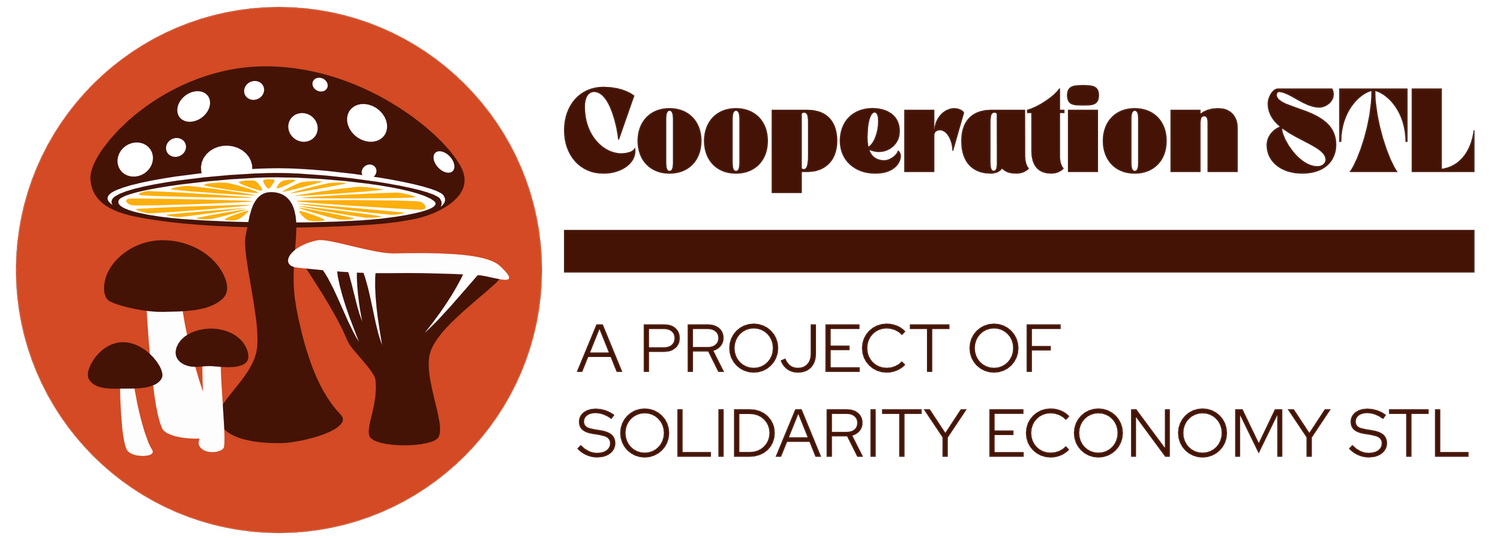IN THIS LESSON
Cooperatives are stronger when we work together to share resources and ideas.
On this page, you will learn about cooperative ecosystem models in other places and what cooperatives already exist in St. Louis.
Cooperation among cooperatives
One of the seven cooperative principles is “cooperation among cooperatives.” When cooperatives work together, we build power towards alternative economies that strengthen our communities.
Cooperatives can support each other by sharing knowledge and resources. All of the cooperatives in the St. Louis ecosystem that you read about in this guide volunteered their time to share their experiences. Cooperatives often share their operating agreements and bylaws for free to support new cooperatives as they form.
As we grow our cooperative ecosystem in St. Louis, we can also learn from work in other regions.
The Arizmendi Association of Cooperatives in the San Francisco Bay Area is a network of nine cooperative bakeries and design and construction companies. They share a central technical assistance cooperative that lowers their individual overhead on administrative needs. When the Association decides to create a new cooperative, existing cooperatives in the network will lend staff time and knowledge to the new cooperative so that it can launch successfully.
Evergreen Cooperatives in Cleveland are owned by a nonprofit organization that functions as a holding company for all of the cooperatives under its umbrella. Each cooperative is democratically controlled by its respective employees. The central holding company owns 20% of the equity in each cooperative and employee owners own the rest. Around 10% of profits from each cooperative go to the holding company to fund the creation of new cooperatives. Evergreen is currently focusing on a model that will acquire existing companies and convert them into worker cooperatives through its Fund for Employee Ownership.
St. Louis has a nascent and growing cooperative ecosystem.
Scroll through the cooperatives below to see a selection of who is currently operating cooperatively in St. Louis and get inspired for your own project.
-
Type: Real estate
Legal entity: LLC
Capital source: Self-funded by half of the members
Members: 10 partners with equal votes - 5 partners invested money, 5 did not
Decision-making: Each member has an equal vote
-
Type: Worker
Legal entity: LLC
Capital source: Loan agreement with former owner
Members: Workers can become members after 1 year, unanimous approval vote from current members, and contributing $2,222 into their capital account.
Decision-making: Consensus among worker-owners
-
Type: Housing
Legal entity: Co-op
Capital source: Capital lease to purchase from initial member-owner
Members: Membership offered to residents after a 6-month trial period
Decision-making: Consensus among resident-owners. Most decisions open to those in trial period; Legal requirement to have a tie breaking system.
-
Type: Multi-stakeholder
Legal entity: 501(c)(3)
Capital source: Founder self-funded and grants
Members: 3 member classes (workers, grocery consumer members, producer co-ops)
Decision-making: A non-profit board makes decisions and solicits feedback from members; workers and members will take over decision-making following training.
-
Type: Worker
Legal entity: LLC
Capital source: Founder self-funded and grants
Members: Worker-owners; offered after an 18 month period and with capital contribution (at least 50% in dollars with remainder in hours)
Decision-making: Members have delegated strategy decisions to the founder currently; daily operation decisions are made collectively by vote.
-
Type: Worker
Legal entity: LLC
Capital source: Self-funded
Members: Worker-owners; optional after a trial period
Decision-making: Consensus among worker-owners
-
Type: Producer
Legal entity: 501(c)(3)
Capital source: Self-funded
Members: Artisans and craftspeople make products for the store
Decision-making: Consensus within a decision-making council of producers
-
Type: Worker
Legal entity: LLC
Capital source: Crowdfunded through promissary notes
Members: 3 owners classes (founder class, investor class, sustainer class (workers)); eventually the sustainer class will buy the company from investors and founders.
Decision-making: Currently, the founder class makes decisions with a super majority; the sustainer class does not have decisions in management but votes on changes to the operating agreement and buy-outs. Decision-making will change when the sustainer class purchases the company.
How might cooperatives in St. Louis support each other?
Download the worksheet and brainstorm with your community.

